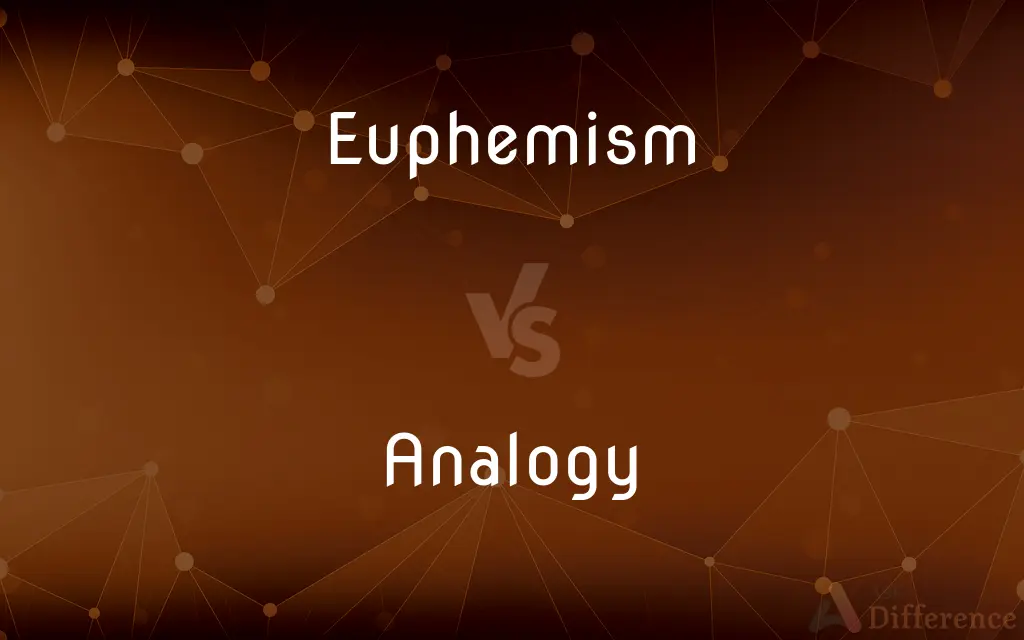Euphemism vs. Analogy — What's the Difference?
By Fiza Rafique & Maham Liaqat — Updated on May 13, 2024
Euphemisms soften harsh realities using milder terms (e.g., "passed away" instead of "died"), while analogies draw comparisons to clarify or explain concepts (e.g., "life is like a box of chocolates").

Difference Between Euphemism and Analogy
Table of Contents
ADVERTISEMENT
Key Differences
A euphemism is a linguistic tool used to replace a word or phrase that is considered impolite, harsh, or unpleasant with a milder or vaguer substitute. While, an analogy is a figure of speech that draws a comparison between two different things, highlighting similarities primarily for clarification or rhetorical effect.
Euphemisms are often employed to mitigate the impact of taboo topics such as death, sexual functions, and bodily functions, aiming to ease social interactions or avoid discomfort. Whereas, analogies are used extensively in both everyday language and various forms of teaching to help explain complex ideas by relating them to more familiar ones.
The use of euphemisms can sometimes obscure the true meaning of a term, which might lead to misunderstandings or dilute the seriousness of a context. On the other hand, analogies enhance understanding and can make abstract or complicated subjects accessible and relatable.
While euphemisms tend to change over time as societal attitudes and cultural norms evolve, analogies can remain effective across different contexts and eras because they are based on logical connections between concepts rather than social sensitivities.
Euphemisms are particularly prevalent in politically correct language, aiming to soften expressions to avoid offending particular groups of people. Analogies, however, thrive in educational settings, literature, and scientific explanations, where a deeper understanding and engagement with the content is desired.
ADVERTISEMENT
Comparison Chart
Purpose
To soften language, avoid offense
To explain, clarify concepts
Usage Context
Taboos, politeness, sensitivity
Education, arguments, illustrations
Impact on Meaning
May obscure or alter meaning
Aims to enhance understanding
Longevity
Changes with cultural norms
Generally stable, based on logical reasoning
Typical Examples
"Passed away" for "died", "let go" for "fired"
"Life is like a box of chocolates"
Compare with Definitions
Euphemism
A linguistic approach to address sensitive subjects without causing offense or discomfort.
Using passed away instead of died.
Analogy
A rhetorical device that helps to illuminate a concept by showing how it is similar to something more familiar.
Explaining atoms are like solar systems.
Euphemism
A mild or indirect word substituted for one considered too harsh when referring to something unpleasant or embarrassing.
Using between jobs instead of unemployed.
Analogy
A method in speech and writing to draw parallel lines between disparate elements to highlight a point or deepen understanding.
A company works like a machine.
Euphemism
Language that conveys politeness or softens the impact of harsh content.
Referring to someone as economically disadvantaged instead of poor.
Analogy
A comparison between two things, typically for the purpose of explanation or clarification.
Saying the heart is like a pump.
Euphemism
A word or phrase that tactfully obscures the true nature of something potentially distressful.
Saying senior instead of old.
Analogy
Used in teaching complex concepts by relating them to everyday experiences.
Understanding a film plot is like unraveling a ball of string.
Euphemism
A tool for adhering to social or political correctness by modifying language.
Describing someone as follicly challenged instead of bald.
Analogy
Analogy (from Greek ἀναλογία, analogia, "proportion", from ana- "upon, according to" [also "against", "anew"] + logos "ratio" [also "word, speech, reckoning"]) is a cognitive process of transferring information or meaning from a particular subject (the analog, or source) to another (the target), or a linguistic expression corresponding to such a process. In a narrower sense, analogy is an inference or an argument from one particular to another particular, as opposed to deduction, induction, and abduction, in which at least one of the premises, or the conclusion, is general rather than particular in nature.
Euphemism
Euphemism () is an innocuous word or expression used in place of one that may be found offensive or suggest something unpleasant. Some euphemisms are intended to amuse, while others use bland, inoffensive terms for concepts that the user wishes to downplay.
Analogy
A comparison between one thing and another, typically for the purpose of explanation or clarification
He interprets logical functions by analogy with machines
An analogy between the workings of nature and those of human societies
Euphemism
A mild, indirect, or vague term for one that is considered harsh, blunt, or offensive
"Euphemisms such as 'slumber room' ... abound in the funeral business" (Jessica Mitford).
Analogy
A similarity in some respects between things that are otherwise dissimilar
Sees an analogy between viral infection and the spread of ideas.
Euphemism
The use of such terms
"Euphemism is common in hospital and medical facilities where bodily functions need to be discussed" (Diane F. Halpern).
Analogy
A comparison based on such similarity
Made an analogy between love and a fever.
Euphemism
(uncountable) The use of a word or phrase to replace another with one that is considered less offensive, blunt or vulgar than the word or phrase which it replaces.
Analogy
(Biology) Correspondence in function or position between organs of dissimilar evolutionary origin or structure.
Euphemism
(countable) A word or phrase that is used to replace another in this way.
Analogy
A form of reasoning based on the assumption that if two things are known to be alike in some respects, then they are probably alike in other respects.
Euphemism
A figure in which a harsh or indelicate word or expression is softened; a way of describing an offensive thing by an inoffensive expression; a mild name for something disagreeable.
Analogy
(Linguistics) The process by which words or morphemes are re-formed or created on the model of existing grammatical patterns in a language, often leading to greater regularity in paradigms, as evidenced by helped replacing holp and holpen as the past tense and past participle of help on the model of verbs such as yelp, yelped, yelped.
Euphemism
An inoffensive expression that is substituted for one that is considered offensive
Analogy
A relationship of resemblance or equivalence between two situations, people, or objects, especially when used as a basis for explanation or extrapolation.
Analogy
(geometry) The proportion or the equality of ratios.
Analogy
(grammar) The correspondence of a word or phrase with the genius of a language, as learned from the manner in which its words and phrases are ordinarily formed; similarity of derivative or inflectional processes.
Analogy
A resemblance of relations; an agreement or likeness between things in some circumstances or effects, when the things are otherwise entirely different. Thus, learning enlightens the mind, because it is to the mind what light is to the eye, enabling it to discover things before hidden.
Analogy
A relation or correspondence in function, between organs or parts which are decidedly different.
Analogy
Proportion; equality of ratios.
Analogy
Conformity of words to the genius, structure, or general rules of a language; similarity of origin, inflection, or principle of pronunciation, and the like, as opposed to anomaly.
Analogy
An inference that if things agree in some respects they probably agree in others
Analogy
Drawing a comparison in order to show a similarity in some respect;
The operation of a computer presents and interesting analogy to the working of the brain
The models show by analogy how matter is built up
Analogy
The religious belief that between creature and creator no similarity can be found so great but that the dissimilarity is always greater; language can point in the right direction but any analogy between God and humans will always be inadequate
Analogy
A literary tool employed to enhance the reader's understanding of a relationship or situation.
Life is a journey.
Common Curiosities
What is a euphemism?
A way of replacing harsh, blunt, or direct phrases with softer, more polite, or vague alternatives.
Can euphemisms be misleading?
Yes, sometimes they can obscure the truth or lessen the impact of reality.
How do analogies help in communication?
They enhance understanding by linking complex ideas to familiar concepts.
What is an analogy?
A comparison used to explain, illustrate, or clarify a concept by showing similarities to something more familiar.
How can euphemisms affect social behavior?
They can promote politeness and sensitivity, but also hinder clear communication.
Are analogies used in everyday conversation?
Yes, people use analogies frequently to explain thoughts and ideas clearly.
What is the difference between a metaphor and an analogy?
An analogy explicitly states the comparison between two things, often using "like" or "as", whereas a metaphor implies the comparison by stating one thing is another.
What are common situations for using euphemisms?
Discussing death, terminations of employment, and bodily functions.
Why might someone avoid using euphemisms?
To ensure clarity and directness in communication, especially in critical situations.
Can the use of analogies improve learning outcomes?
Yes, they can make learning new and complex ideas easier by connecting them to known experiences.
Why use euphemisms?
To avoid offending or causing discomfort while discussing sensitive, unpleasant, or taboo topics.
How do cultural differences impact the use of euphemisms?
Different cultures have varying sensitivities, which can influence the acceptance and use of certain euphemisms.
Can analogies be used in all types of communication?
Yes, they are versatile and can be adapted for educational, professional, and casual contexts.
Are analogies and similes the same?
No, similes are a specific type of analogy that always use "like" or "as" to make the comparison.
Are analogies only used in language arts?
No, they are also used in science, business, and other areas to clarify and relate concepts.
Share Your Discovery

Previous Comparison
Conversation vs. Discourse
Next Comparison
Sprig vs. TwigAuthor Spotlight
Written by
Fiza RafiqueFiza Rafique is a skilled content writer at AskDifference.com, where she meticulously refines and enhances written pieces. Drawing from her vast editorial expertise, Fiza ensures clarity, accuracy, and precision in every article. Passionate about language, she continually seeks to elevate the quality of content for readers worldwide.
Co-written by
Maham Liaqat












































